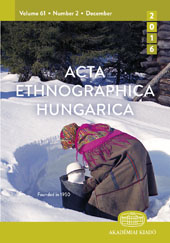The Role of Women in African Traditional Religions
The Role of Women in African Traditional Religions
Author(s): Henryk ZimońSubject(s): Gender Studies, Cultural history, Gender history, Cultural Anthropology / Ethnology, History of Religion
Published by: Akadémiai Kiadó
Keywords: African people; sub-Saharan Africa; African traditional religions; beliefs and rituals; religion and gender; gender differences and roles; women’s study;
Summary/Abstract: Ethnological and religious studies point to differentiation in the status of men and women, which eventually results from cultural conditions, and not from biological differences. Many researchers indicate asymmetry connected with the gender, which also refers to the religious sphere. The nonliterate peoples consider life to be the fundamental value and that is the reason why their cultural and religious traditions put emphasis on woman’s biological functions and see procreation as her main vocation and task. A woman performs the role of a native doctor and healer among many African peoples, since the basic medical care takes place within the family. In Africa older women after menopause perform priestly duties to a smaller degree. Researchers of the African peoples emphasize that spirit possession takes place more frequently in the case of women than men, which they consider a reaction to the inferior status of women in the social, political and religious life. Both men and women are diviners among many African peoples. Among some peoples of Eastern and Southern Africa women control the Earth fertility and they are renowned rainmakers. Women belong to secret societies in some African peoples. Both men and women can be sorcerers and witches, although among many African peoples it is more often older women who are accused of witchcraft, which is explained by social and economic inequality and the desire for power.
Journal: Acta Ethnographica Hungarica
- Issue Year: 51/2006
- Issue No: 1-2
- Page Range: 43-60
- Page Count: 18
- Language: English
- Content File-PDF

